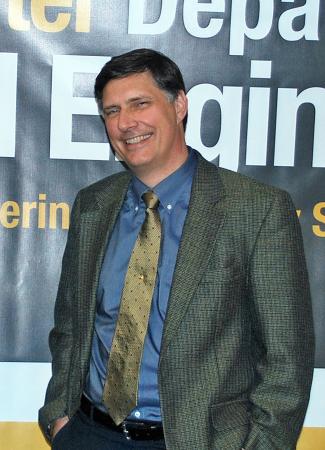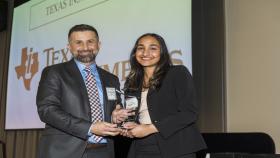The Kern Family Foundation has added the Georgia Institute of Technology to its growing partnership of universities that comprise the Kern Entrepreneurial Engineering Network (KEEN), all working to instill an entrepreneurial mindset in their students, inspiring undergraduate engineers to think critically and see the bigger picture, to recognize opportunities, evaluate markets, and learn through trial and error.
It’s a relationship with roots in the 2015 meeting of the Biomedical Engineering Society in Tampa, Florida. Joe Le Doux, associate chair for undergraduate learning and experience in the Wallace H. Coulter Department of Biomedical Engineering (BME) at Georgia Tech and Emory University, was attending the event, where he met Doug Melton, KEEN program director.
“I mentioned that I was mentoring a student group whose vision was to be ‘intrapreneurs’ in our department,” says Le Doux.
Melton knew exactly what Le Doux was talking about – an intrepreneur is someone who behaves like an entrepreneur within a larger organization, integrating risk-taking and innovation to solve problems. That initial conversation in Florida led to future interactions, including a campus visit.
“Basically, the BME department and KEEN got to know each other better and realized our goals were well-aligned,” Le Doux says.
And that led to the Coulter Department and Georgia Tech joining the network, and membership has its privileges. KEEN institutions can apply for funding to develop programs that build an entrepreneurial mindset.
Toward that end, the Coulter Department found out recently that it was successful in its pitch to develop student portfolios, acquiring a KEEN Award valued at $1.5 million over three years, beginning February 2018. The project is being spearheaded by a team of BME faculty and staff that includes co-principal investigators Paul Benkeser and James Stubbs, and project manager Kim Paige.
“KEEN’s investment will help the department pursue a goal we’ve had for some time,” says Le Doux. “We want to develop a portfolio program that will help students capture, reflect on, and tell stories of their entrepreneurial achievements, how they created value for themselves and others through their educational work as students at Georgia Tech. We believe KEEN can help elevate our efforts to foster an entrepreneurial mindset within our students.”
Le Doux describes the portfolios that BME students will develop as “more than a pitch, less than a novel, a professional narrative where students learn to tell their stories, of their failures and accomplishments, stories that share the multiple perspectives of the people who were involved, and in a way that listeners can learn how to be, and become more motivated to be, an entrepreneurial person who creates value for others.”
According to KEEN’s leadership, an entrepreneurial mindset consists of three key elements: curiosity, connections, and creating value: Entrepreneurially minded people are curious about the changing world (and employ a contrarian view of accepted solutions); habitually connect information from multiple sources to gain insight and manage risk; and create value for others from unexpected opportunities while persisting through (and learning from) failure.
The idea is, if a graduating BME student, having collected his/her experiences and artifacts along the way, can bridge the gap between “knowing how” and “knowing why,” their chances of developing that entrepreneurial mindset will only increase. This is bigger than just landing the right job or career, Le Doux says: “The goal is for students to have a greater understanding of who they are, what they’ve accomplished, and where they are going, and what they are going to accomplish along the way.”
That said, such wide-ranging skills can only help when it comes to finding good work, and Le Doux has anecdotal proof of the concept.
“I gave a workshop at a conference and a guy who describe himself as a serial entrepreneur, who had been in the business of hiring people for 20 years, said that he typically looked for a job prospect’s ability to tell their own story more than a bullet list of skills,” Le Doux says. “The person who can articulate their powerful vision is who he wanted to bring to the team.”
Le Doux envisions a prototype program in the Coulter Department that can eventually be scaled up across campus and across the country.
“Our students obviously need those technical skills, but when they graduate, they can’t rely on skillsets alone,” Le Doux says. “Stories make meaning of our prior experiences. If we do this right, our students are going to graduate with professional and interpersonal competencies that will help them understand and explain what they learned, and why its relevant.”
Media Contact
Jerry Grillo
Communications Officer II
Parker H. Petit Institute for
Bioengineering and Bioscience
Keywords
Latest BME News
Jo honored for his impact on science and mentorship
The department rises to the top in biomedical engineering programs for undergraduate education.
Commercialization program in Coulter BME announces project teams who will receive support to get their research to market.
Courses in the Wallace H. Coulter Department of Biomedical Engineering are being reformatted to incorporate AI and machine learning so students are prepared for a data-driven biotech sector.
Influenced by her mother's journey in engineering, Sriya Surapaneni hopes to inspire other young women in the field.
Coulter BME Professor Earns Tenure, Eyes Future of Innovation in Health and Medicine
The grant will fund the development of cutting-edge technology that could detect colorectal cancer through a simple breath test
The surgical support device landed Coulter BME its 4th consecutive win for the College of Engineering competition.








